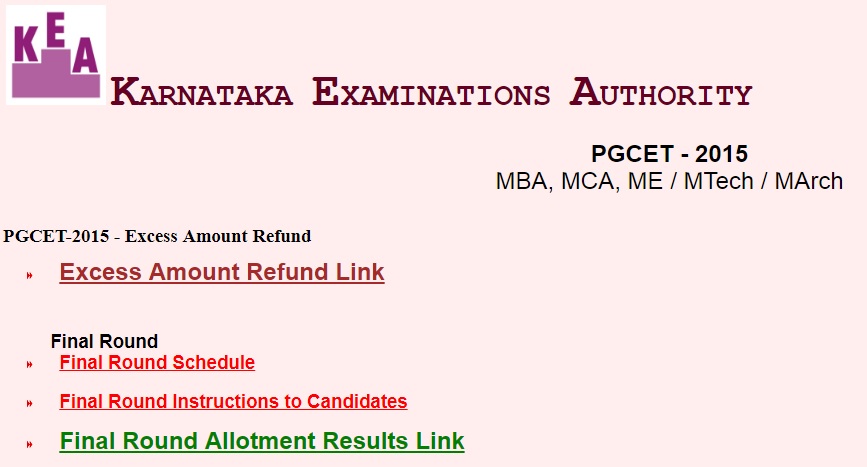kea.kar.nic.in PGCET Architecture Question Paper : Karnataka Examinations Authority
Name of the Organisation : Karnataka Examinations Authority
Name of the Exam : PG Common Entrance Test – PGCET
Subject: Architecture
Year : 2015
Document Type : Question Paper
Website : https://cetonline.karnataka.gov.in/kea/indexnew
Download Model Question Paper :
Architecture 2010 : https://www.pdfquestion.in/uploads/13524-Architecture2010.pdf
Architecture 2011 : https://www.pdfquestion.in/uploads/13524-Architecture2011.pdf
Architecture 2013 : https://www.pdfquestion.in/uploads/13524-Architecture2013.pdf
Architecture 2014 : https://www.pdfquestion.in/uploads/13524-Architecture2014.pdf
KEA PGCET Architecture Question Paper
Time: 2 Hours
Max. Marks: 100
Read the following instructions before answering the test :
** Write / Darken the particulars of your identity, Test Seat Number and afix your signature on the OMR Response Sheet before the start of the ” test.
Related : Karnataka Examinations Authority M.Tech Common Entrance Test Polymer Science & Technology Question Paper : www.pdfquestion.in/13520.html
** All Questions have multiple choices of answers, of which only one is correct.
** Mark the correct answer by completely darkening only one oval against the Question number using Black Ink Ball Point pen only.
** There will be no negative evaluation with regard to wrong answers.
** Marks will not be awarded if multiple answers are given.
** Do not make any stray mark on the OMR Response sheet.
** For rough work, use blank page on the question paper.

** Taking the question paper out of the test hall is permitted only after then full duration of the test.
** Use of only non-programmable calculator is permitted.
** Start Answering Only At The Specified Time When The Invigilator Gives Instructions.
Marks Distribution :
PART — I 50 Questions: 50 x 1 = 50 Marks
PART – II 25 Questions: 25 x 2 = 50 Marks
Total = 100 Marks
1. Hector Guimard was associated with
a) Arts and Crafts Movement
b) Art Nouveau Movement
c) Italian Futurism
d) De Stijl Movement
2. Piano nobile of the Italian palazzo refers to the
a) second floor
b) third floor
c) ground floor
d) first floor (above the ground floor)
3. The concept of bio-climatic skyscraper is associated with
a) William Lim
b) Ken Yeang
c) Mario Botta
d) Channa Daswate
4. The ideologies of architects, according to Jon Lang, fall under
a) normative theory
b) positive theory
c) scientific theory
d) explanatory theory
5. Golden section refers to the division of a line into two parts a and b such that Corbuiser chose to propound FIVE points of architecture in reference to
a) FIVE fingers of hand
b) FIVE orders of architecture
c) FIVE elements of nature
d) FIVE proportions
6. “Layering of facades’ and “Sense of Centre’ are the basic tenets of
a) B.V. Doshi
b) Charles Correa
c) Anant Raje
d) Achyut Kanvinde
7. If the height of a building is h and distance of viewing is d, then distance – relation ratio is h;d. If h;d is 1:3, we
a) tend to see object as edge
b) tend to notice details more than the façade
c) tend to see object as whole together with details
d) tend to see the building in relation to surrounding objects
8. Compared to the Greek agora, the Roman Forum was more
a) symmetrical
b) scattered
c) structured
d) open
9. As the population size of cities increases, the percentage of area under residential use usually
a) increases
b) decreases
c) remains the same
d) increases marginally
10. If the age-sex pyramid of a settlement is broad at the base and narrow at the middle and top, it indicates that the
a) settlement has employment opportunity
b) settlement’s population is aging
c) settlement has young population
d) settlement has poor employment opportunity
11. The Dasavatara Temple at Deogarh belongs to which period
(A) Kalinga
(B) Chalukya
(C) Gupta
(D) Maurya
12. Sanctum sanctorum of a Temple is otherwise called
(A) Kund
(B) Garba griha
(C) Mandapa
(D) Antarala
13. The five rathas at Mamallapuram belong to which style?
(A) Chola
(B) Pandya
(C) Nayak
(D) Pallava
14. Revival of Gothic cathedrals was carried out by
(A) Viollet-Le-Duc
(B) Francois Blondel
(C) Mies van der Rohe
(D) Vitruvius
15. GIS stands for
(A) Geological Survey of India
(B) Geography of India Survey
(C) Geological Ideology Survey
(D) Geographic Information System